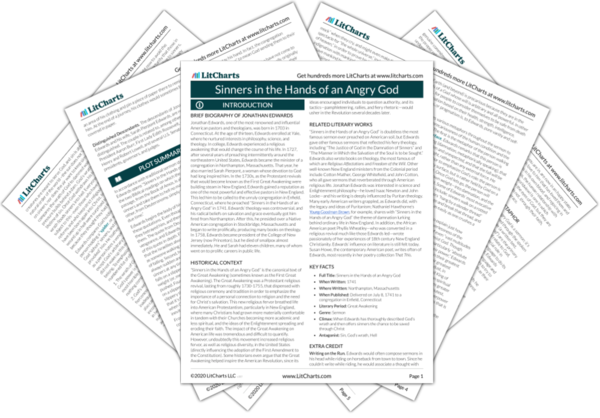Power and Precariousness
Jonathan Edwards returns over and over to the notion that, while human beings might think that they have power over their own lives, their position on Earth (and beyond) is precarious because they are in the hands of a God whose will is arbitrary and all-powerful. In other words, for people to consider themselves to be safe from death or damnation based on their health, strength, intelligence, goodness, or pragmatism is, to Edwards, pure vanity…
read analysis of Power and PrecariousnessWrath, Mercy, and Grace
Throughout the sermon, Edwards emphasizes that God loathes all human beings because they are not worthy of him, he’s angry with them for failing him, and he owes them no mercy. This attitude can be summed up by the notion that God’s primary characteristic is his wrath. Edwards expresses this colorfully in several instances, including this famous one: “The God that holds you over the pit of Hell, much as one holds a spider…
read analysis of Wrath, Mercy, and GraceLanguage and Metaphor
Sinners in the Hands of an Angry God is a sermon: it’s a message about God delivered through the spoken word. As sermons and the Bible (a written text, whose words are “the words of the great God”) are the primary modes by which a person can understand and relate to God, language should be understood as having a special role in religion and faith. In this instance, in order for language to do its…
read analysis of Language and Metaphor
Theology and the Human Condition
Edwards’ theology is based on several intricate beliefs about the human condition, beliefs he has gleaned directly from the Bible. Human nature, he believes, is good in its purest form, but has been tainted by original sin (passed down from Adam and Eve), which has infected people with evil. Because of original sin and the evil into which it leads people, human goodness and salvation depend on a person’s ability to become born again…
read analysis of Theology and the Human Condition






